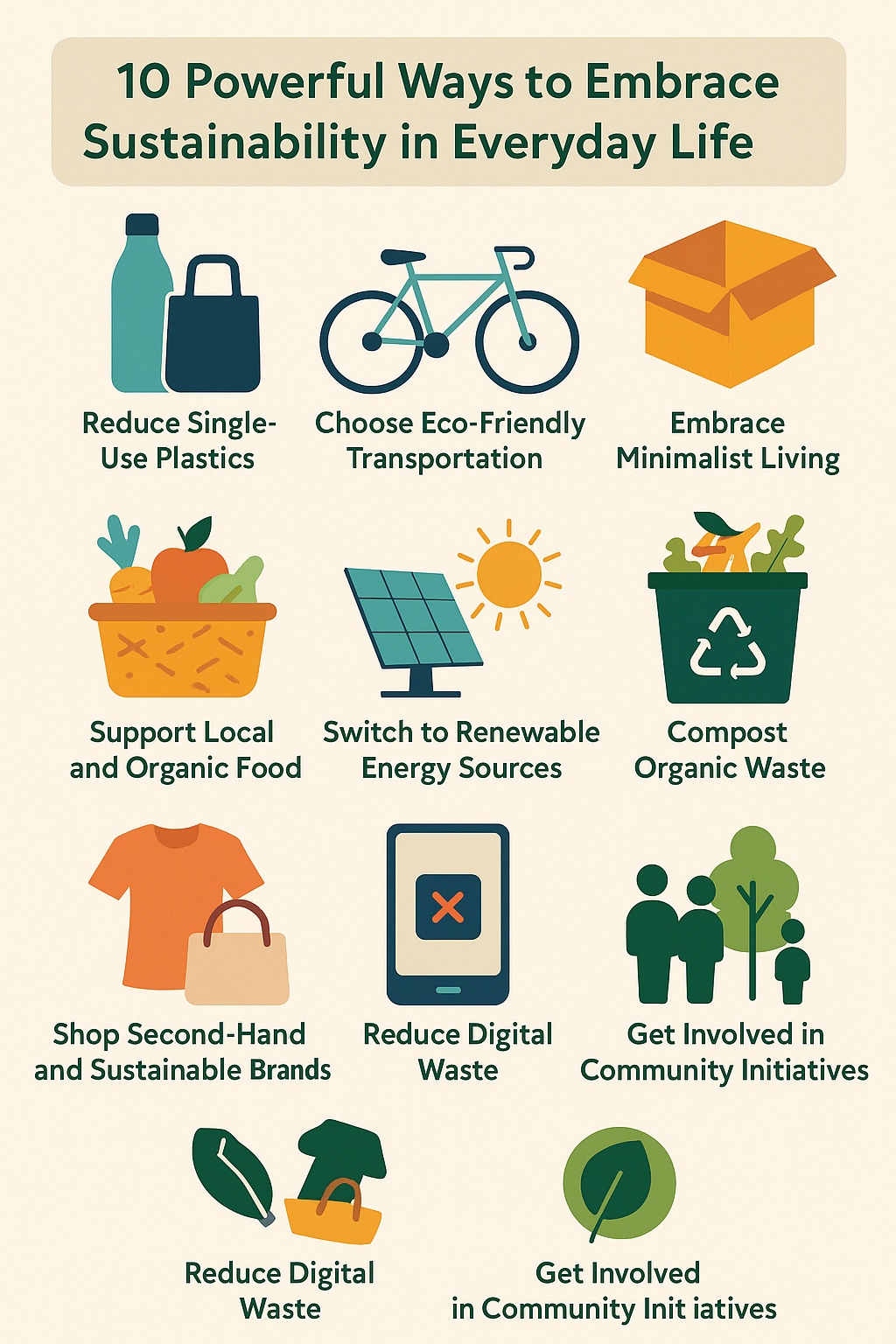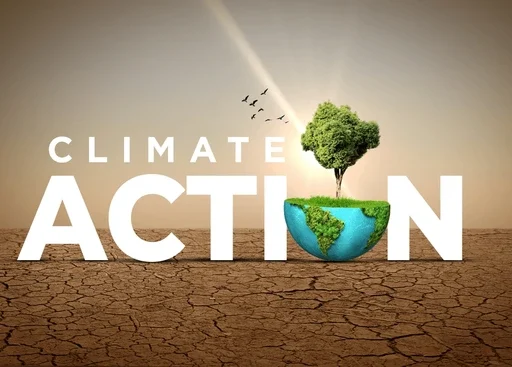Adopting sustainability is not just a fad but also a requirement in the fast-paced world of today. People must act to lessen their environmental effect as pollution, resource depletion, and climate change worsen. Thankfully, leading a sustainable lifestyle doesn’t need significant compromises. You can help create a healthier world, save money, and live more thoughtfully by implementing tiny but important changes to your daily routine. This article examines ten straightforward yet effective lifestyle options that encourage sustainability and provide you the flexibility to make environmentally responsible choices. These tactics are useful, effective, and simple to put into practice, regardless of your degree of experience with green living.

Reduce Single-Use Plastics
Cutting back on single-use plastics is one of the easiest ways to embrace sustainability. Ocean pollution, damage to animals, and chemical leakage into ecosystems are all caused by plastic garbage. Commonplace objects like shopping bags, straws, and water bottles are frequently used just once before being thrown away, where they can linger in the environment for decades.
Making the switch to reusable alternatives is a sensible and efficient move. Cloth shopping bags, bamboo cutlery, and stainless steel bottles all greatly cut down on waste. Reusable food storage options include silicone lids and beeswax wraps. Making these changes will ultimately save you money in addition to promoting sustainability.
| Item | Disposable Plastic | Sustainable Alternative |
|---|---|---|
| Water bottle | PET bottle | Stainless steel bottle |
| Grocery bag | Plastic bag | Cloth or jute bag |
| Food wrap | Plastic wrap | Beeswax wrap or silicone lid |
Choose Eco-Friendly Transportation to Get Sustainability
Nearly 24% of CO2 emissions worldwide are attributable to the transportation sector, making it a significant contributor to global emissions. One of the biggest adjustments people can make is to choose more environmentally friendly ways to travel. Using public transportation, walking, bicycling, and carpooling are more ecologically beneficial options than driving alone.
If you must have a car, think about an electric or hybrid automobile. These choices support green living ideals and significantly lessen your carbon impact. In addition to being environmentally friendly, choosing to walk or ride a bike for short distances improves your physical and emotional health. By choosing lower-emission options, you’re actively participating in sustainability on a daily basis.
| Transport Method | CO₂ Emission (g/km) |
|---|---|
| Gasoline Car | 192 |
| Electric Vehicle | 50–100 |
| Bus | 68 |
| Bicycle / Walking | 0 |
Conserve Water at Home
Despite being one of the planet’s most valuable resources, water is frequently wasted carelessly. Making little adjustments to your water usage can significantly lower family usage and contribute to global environmental initiatives.
Small yet efficient behaviors include installing low-flow showerheads, repairing leaking faucets, and shutting off the faucet when brushing your teeth. Making the transition to drought-resistant plants or collecting rainwater for gardening can have a big impact. Water and energy may also be saved by only running washing machines and dishwashers when they are completely loaded.
Water Savings from Common Fixes:
| Action | Liters Saved/Day |
|---|---|
| Fixing a dripping tap | 15–20 |
| Low-flow showerhead | 35–45 |
| Turning off tap while brushing | 10–15 |
Embrace Minimalist Living with Sustainability
Living with less does not imply deprivation; rather, it indicates purpose. The minimalist way of living encourages individuals to buy and use just what they really need, which helps to promote sustainability. Not only can clearing clutter improve your house, but it also lessens your environmental impact.
Minimalism reduces waste, the carbon footprint, and impulsive purchases. It encourages purchasing lasting, ethically produced, and ecologically conscious goods, emphasizing quality over quantity. Choosing fewer, better products may have a significant impact on home goods, technology, and fashion. Benefits of Minimalist Living:
- Reduces household waste
- Encourages ethical consumption
- Saves money long-term
- Enhances mental clarity
Support Local and Organic Food
The health of the world is significantly influenced by the food we eat. By avoiding dangerous pesticides that deteriorate soil and water quality and lowering transportation emissions, selecting organic products and supporting local farmers promotes sustainability. Local food systems originate from smaller farms that follow ethical farming methods, use less preservatives, and travel shorter distances. By avoiding synthetic pesticides and fertilizers, organic farming enhances biodiversity and soil health. Choosing local and organic food also supports your health and community economy making it a win for both people and the planet.
| Criteria | Local Food | Imported Food |
|---|---|---|
| Transportation | Minimal | High |
| Freshness | Higher | Lower |
| Environmental impact | Low | High |
Switch to Renewable Energy Sources to Achieve Sustainability
One of the most significant actions you can do to achieve sustainability is to switch to renewable energy. Renewable energy sources like solar, wind, and hydro provide long-term, clean alternatives to fossil fuels, which are limited and harmful. Installing solar panels, signing up for a community solar program, or choosing a green energy plan, if your utility company provides one, are some ways to make this change. Many renewable energy choices save money over time through tax rebates and lower rates, despite the upfront outlay. Renewables align directly with global sustainability targets, helping to reduce your carbon footprint while contributing to a cleaner, more resilient grid. The advantages of renewable energy:
- Reduces greenhouse gas emissions
- Lowers electricity costs over time
- Increases energy independence
Compost Organic Waste
A significant amount of organic garbage and food scraps end up in landfills, where they emit the powerful greenhouse gas methane. By diverting this garbage and converting it into nutrient-rich soil, composting promotes a circular economy model that is crucial to sustainability.
Composting can be done inside with odor-free techniques like vermicomposting or bokashi, or outdoors in containers. It’s a great method to improve your garden, cut down on landfill waste, and use less artificial fertilizer. There are choices for composting whether you live in a house or an apartment. Composting encourages appropriate waste management techniques in addition to promoting soil health.
- Fruit and vegetable scraps
- Coffee grounds and tea leaves
- Eggshells
- Yard clippings and dry leaves
Reduce Digital Waste
Few people are aware of how internet activity affects the environment. Cloud storage, streaming services, and emails all depend on large data centers that use a lot of electricity. A contemporary yet essential step toward sustainability is minimizing your digital footprint. Eliminating outdated emails, unsubscribing from pointless newsletters, and effectively preserving files are good places to start. Energy conservation can also be achieved by adopting dark mode and turning off electronics when not in use. If at all feasible, use cloud providers that use renewable energy. Digital minimalism supports both mental clarity and environmental sustainability in the digital age. Tips to Minimize Digital Waste:
- Use energy-efficient devices
- Avoid unnecessary cloud storage
- Clean inboxes and clear app cache
- Uninstall unused apps
Get Involved in Community Initiatives
While individual acts have great power, group efforts increase their influence. Participating in or planning neighborhood sustainability events, such as beach clean-ups, tree-planting campaigns, or eco-workshops, fosters a sense of collective accountability and initiative.
Nowadays, a lot of cities have repair cafés, local zero-waste shops, or sustainability clubs. Participating in these initiatives promotes ties within the community and speeds up systemic change. Even assisting neighbors in beginning composting or raising awareness on social media may have an impact. Participating in the community not only increases your influence but also sustains your inspiration and drive. By working together, we can build a more resilient and sustainable future for future generations.
Shop Second-Hand and Ethical Brands
Sustainability affects many aspects of our life, not only the clothes we wear. A key step in living a greener lifestyle is selecting ethical and environmentally friendly items. Thrift stores, garage sales, and internet marketplaces provide a wide range of products, including electronics, books, kitchen appliances, furniture, and even tools. Buying these things used prolongs their life cycle, lowers the demand for manufacture, and prevents useable goods from ending up in landfills. For instance, refurbished devices provide a more affordable and environmentally friendly option than brand-new ones. Finding high-quality used goods is made simple by websites like eBay, Facebook Marketplace, and neighborhood swap clubs. Additionally, a lot of ethical firms now sell things made from recycled or salvaged materials, such as old cookware and wood tables. We actively promote sustainability by lowering waste, preserving resources, and promoting a more circular economy by implementing this strategy across all categories.








